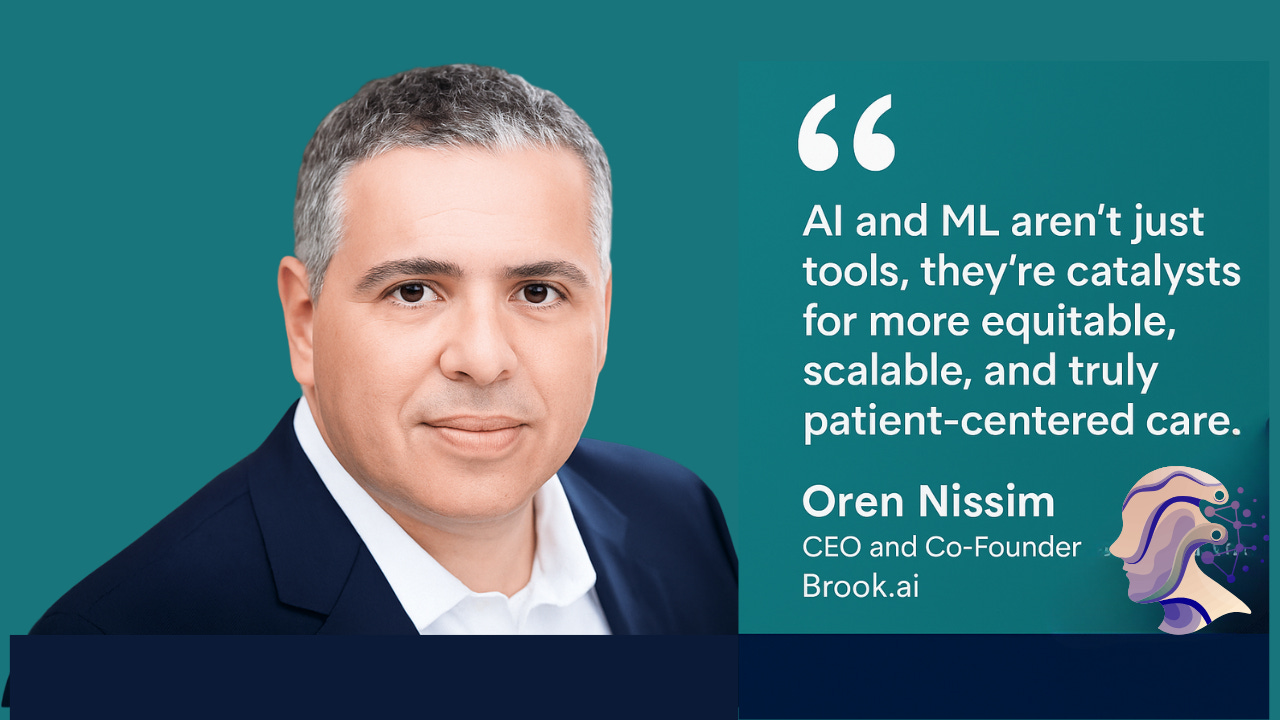Artificial intelligence in healthcare is no longer a theoretical concept. It’s practical, personal, and, done right, transformational.
Oren Nissim, CEO and Co-Founder of Brook.ai, is one of the leaders driving that transformation. His company’s philosophy is simple: technology should amplify care, not replace it.
From Data Overload to Actionable Insight
“There’s a growing emphasis on actionable data, not just data collection, but a real shift toward analytics that filter out the noise, uncover meaningful information, and provide real-time guidance that providers can trust.”
For too long, healthcare has been overwhelmed by data that clinicians have been unable to utilize. Oren sees early wins from AI model deployments, which restore confidence and inspire teams to embed these technologies more deeply into clinical workflows, creating systems that predict risk and support both providers and patients.
Interoperability as a Foundation, Not an Option
While many health systems are still catching up to modern interoperability, Oren sees a new wave of leadership emerging; those who understand that data exchange must be secure, standardized, and strategic.
“The healthcare organizations that will lead are those that invest in both innovative technologies and the infrastructure and governance models that ensure sustainable impact.”
It’s not enough to innovate quickly; you must innovate responsibly.
Why Clean Data Still Wins
Clean data is still the quiet hero of every success story. It gives teams the confidence to trust their insights, personalize care, and focus resources where they matter most.
“Clean, high-quality data empowers care teams to trust the information guiding critical decisions.”
Oren is candid about the work that still needs to be done. Providers and payers need to prioritize data quality the same way life sciences organizations already do, and EHR vendors must support, not stifle, data usability.
AI as a Catalyst for Connection
“AI and ML aren’t just tools—they’re catalysts for more equitable, scalable, and truly patient-centered care.”
At Brook.ai, Oren’s team is transforming AI into a bridge between patients and providers, enabling care that is continuous, proactive, and equitable. From automating administrative tasks to identifying subtle patterns in behavioral data, Brook’s model ensures clinicians spend less time on paperwork and more time on people.
Done right, AI isn’t about replacing judgment; it’s about expanding empathy.
Seeing the Human in the Data
Oren highlights an often-overlooked truth: data is human. The loneliness epidemic, transportation barriers, and cultural nuances all shape health outcomes, yet rarely appear in traditional datasets.
The next evolution in analytics must be empathetic design—building tools that simplify workflows, close the feedback loop, and translate predictions into real interventions.
“Analytics not only have to describe problems accurately but also drive meaningful solutions.”
Why HLTH 2025 Matters
As remote care matures from pilot to expectation, Oren hopes that HLTH 2025 conversations will focus less on potential and more on measurable results, embedding remote and AI-driven care into real-world workflows, reimbursement models, and community strategies.
The goal: equitable, scalable, human-centered systems that improve outcomes and elevate both patient and clinician experience.
🔥 This is the eighth feature in my Before HLTH Talks: Voices of Change series—spotlighting leaders redefining what actionable, compassionate, data-driven healthcare looks like.
👉 Meet Oren Nissim and the Brook.ai team at #HLTH2025, and if you haven’t registered yet, here’s your link: https://hlth.com/events/usa/
#BeforeHLTHTalks #VoicesOfChange #HLTH2025 #AIinHealthcare #DigitalHealth #HealthEquity


